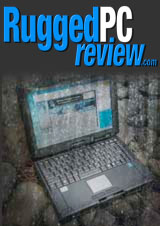
Periodically, we ask industry leaders in the rugged computing and communications market questions about their products, their views, and their opinions on trends, emerging technologies and a variety of other issues.
RuggedPCReview: Did you see business activities for Getac coming back in 2023?
Mike McMahon, Getac: We are seeing normalcy in the marketplace again! It has been a gradual ramp-up, but attendance at trade shows, increased business travel for our sales departments and attendance in our offices are returning to pre-COVID levels. Our status as a leading provider of high quality innovative rugged computing systems solutions led to adding two major Fortune 500 companies to Getac North America's growing customer base. Additionally, Federal Government business, which had been on hold in the first half of 2022, came back in the second half of 2022 and in this year, and we are now seeing a gradual increase in sales.
RuggedPCReview: What are you seeing as the new trends in mobile computing?
Mike McMahon, Getac: Edge computing is a fairly new trend that allows remote field workers to become more productive by processing and analyzing data right where they collect it, rather than sending it back to headquarters that then sends it to the cloud for processing. Mobile edge computing — or MEC — is the near-real-time processing of large amounts of data produced by edge devices and applications closest to where it's actually captured.
In essence, MEC extends the edge of the network infrastructure thanks to the performance and capabilities of new computing and communications technology. That lets companies to distribute and use a common pool of resources across a multiple locations. With high-powered 5G wireless-enabled systems, mobile edge computing enables remote workers in industries such as architecture, construction, engineering and others to deploy complex 3D renderings in the field, or use augmented reality applications that used to be much too data-heavy to work remotely.
Overall, mobile edge computing with 5G wireless will connect machines, objects, devices and people with high-bandwidth, ultra-reliable low-latency communication. This will be of great benefit to operations in transportation logistics, and healthcare — areas where split-second action can be the difference between success and failure, or even life and death.
Another interesting trend is artificial intelligence edge computing. Edge AI's ability to more securely do real-time analytics at higher speeds, lower costs and with less power will made it an attractive alternative to cloud computing AI. Companies in manufacturing, healthcare and energy will take advantage of that, making it an integral part of mission-critical mobile computing going forward.
RuggedPCReview: Getac recently announced the alliance of its Video Solutions Company with Getac North America. What is the benefit of that for the marketplace?
Mike McMahon, Getac: This alliance combines two very experienced technology infrastructure resources. We are calling it "One Getac." Our focus now has increased to a broader range of law enforcement and public safety agencies including those serving small and midsize jurisdictions.
Among customer benefits of the new One Getac are enhanced solutions programs. Those include a dedicated team devoted to servicing law enforcement and public safety, and an in-vehicle solutions team bringing years of experience and know-how in that area. There is also an evidence capture program for body-worn cameras (BWC) and we're implementing an in-vehicle video system to advance informed tracking and decision-making.
Another important offering is Getac Enterprise — cloud-based data management integration for real-time information-sharing using Microsoft's Azure platform. It's a scalable system that provides first responders a place to easily upload, organize, and review video, saving time and boosting efficiency across all departments.
RuggedPCReview: We've heard in the past that the rugged computing industry is changing from a product focus to a solution focus. Is this still the case, and if so, has Getac's focus changed as well?
Mike McMahon, Getac: Yes, Getac believes in offering solution-based products and being a convenient one-stop-shopping partner to customers. Vertical industry sector-specific solutions continue to be a priority. Getac recently had a major win in the transportation sector attributable to Getac's belief in truly learning and understanding a customer's business, not just in a macro sense but in a deep understanding of all the daily tasks that the customer experiences in order to get their job done. That allows us to offer a total solutions package that addresses their pain points and improves their work efficiency and productivity. This is why we aim to offer state-of-the-art portfolios that include hardware, software, accessories, and services — everything a customer needs to help them work efficiently and productively.
RuggedPCReview: Recently, Getac published a White Paper called, "The Rugged Value Proposition." Tell us a little about what this research document is about and why you felt it would be meaningful in the marketplace.
Mike McMahon, Getac: An issue in our industry is vendors pushing mobile systems that they claim are "rugged" and pass MIL-STD tests even though most use lightweight plastic cases and are clearly not designed to handle challenging environments in the field. We also continue to see companies buying lightweight consumer tablets enclosed in aftermarket cases that promise to provide an acceptable level of ruggedization, but then may quickly fail, causing downtime and losing productivity. At Getac we know from 30 years of experience of designing and manufacturing truly rugged equipment that unless a device is built right from the ground up and then comprehensively tested for drop shock, water intrusion, dust, heat, etc., it does not deserve to be called "rugged."
This is why we did that White Paper, to clear up the confusion about what, exactly, "rugged" means and why it is so important out there in the field and on the job to have equipment that won't let people down. The paper is available free at The Rugged Computing Value Proposition.
RuggedPCReview: Mobile computing is experiencing an increase in Android-based rugged devices. Is the demand for them primarily due to migration from Windows CE and Windows Mobile devices or are there other reasons that may establish Android not just as an alternative to Windows, but as a platform with complementary or even unique functionality and applicability?
Mike McMahon, Getac: COVID fostered a global trend to work remotely, and that contributed to a substantial increase in laptop and tablet sales. People now return to work in the office and many companies allow them to bring their devices to the workplace. That's BYOD — Bring Your Own Device — whether they are smartphones, tablets, or laptops. Initially, employees used only company-issued devices in the workplace. With the proliferation of smartphones and consumer tablets at work, a lot of employees now come to work with their own internet-connected devices.
That means potential security risks, and companies are now engaging in beefing up security and installing security procedures, along with employee education. Mobile Device Management (MDM) software offers a good balance between central IT oversight and ease-of-use for employees, offering the ability to deploy, secure, and integrate BYOD devices into a network and then monitor and manage those devices centrally.
RuggedPCReview: Market resource firms estimate that handheld revenue makes up about half of the global market for ruggedized mobile computers. In the past, Getac has offered rugged handhelds, but there are none in the current product lineup. What is the rationale for that?
Mike McMahon, Getac: Getac customers overwhelmingly request larger screens. There are a lot of tasks that benefit from having more screen real estate than handhelds are limited to. There's a huge difference between a 6-inch screen and a 10-inch screen when you're dealing with complex apps. Because it has a larger screen than a handheld, our 10-inch Android-based ZX10 is quite popular with our customer base.
Also, the supply chain for handhelds is very different from that for laptops and tablets. We are monitoring that and keep evaluating the potential for going into manufacturing and distribution of rugged handhelds. Ultimately, the decision whether or not to provide handhelds will depend on our customers' needs and reqyurirements
RuggedPCReview: Anything you can share about the next generation of Getac products?
Mike McMahon, Getac: Recently, Getac announced the new X600 mobile workstations including the X600, X600 Pro and the X600 Server model with PCI expansion. Those are very powerful, very expandable and fully rugged machines that represent massive upgrades over their predecessor X500 platform. We also recently launched the upgraded B360 fully rugged laptop that offers a pretty compelling combination of features and performance in an amazingly compact, lightweight form factor.
Mike McMahon is President of Getac North America. He held prior executive and management positions at Kopin Corporation, RISC Networks, Panasonic, Tape Resources and Sony. Mr. McMahon holds a BFA degree in Mass Communications/English from Emerson College.











